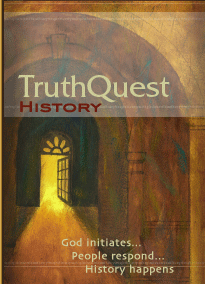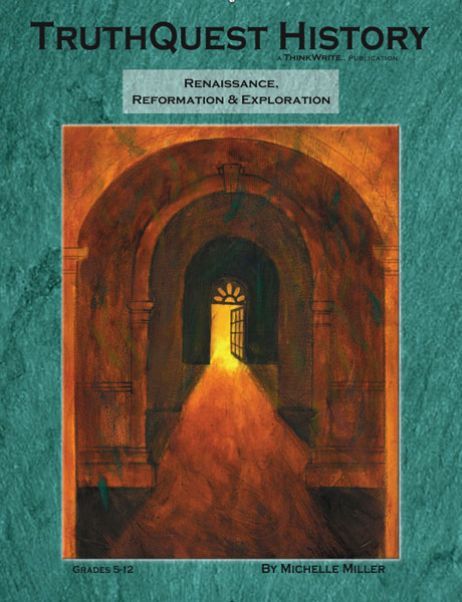History curricula abound. Whatever you may feel about the teaching of history, no one can deny that it has to be taught. One cannot live in the present world without knowing, or at least being aware of, what happened before our time. History is fundamental to any good education, and especially to a classical education. We need to learn from those who have gone before us. History is a great teacher if interpreted properly.
So, the question is "What should I use to teach history to my kids?" There are a lot of good curricula out there, but as a member of the Old Schoolhouse Crew I was given the privilege to try out TruthQuest History Guide.
What is TruthQuest History?
TruthQuest History is a History curriculum written by a veteran homeschool mom, Michelle Miller. Its main characteristic, besides being overtly Christian, is that it uses literature to teach History. The curriculum contains an overview, or summary, of the theme or time period being studied at the beginning of each historical section in the book. Then, the student is led and encouraged to read books (fiction and non-fiction) on the particular topic.
Another main characteristic of TruthQuest History is its claim to present History from a unique, innovative point of view:
From the website:
"Parents, think back on your years as a student in history class. There was one focus: human actions... so we assumed history was the "story of humankind." Though we eschew humanism, we can unknowingly teach history to our children as we were taught. We look only at the people of yesteryear. Is it any wonder history seems so futile and fruitless, so past-oriented, insignificant, and weak?
Since nothing began without the Lord God, history is actually the mighty story of what He has initiated, revealed about Himself, and said to be true. People are not the makers of history, He is. God initiates and people respond... thus history happens.
This huge difference transforms the deepest nature of your history study. It impresses your children with the involvement and impact of God above that of people. History becomes a convincing demonstration of His nature, power, and love. Truth-revealing history is no mere recitation of the past, but prepares for the present and future! It is the mission of TruthQuest History to provide deep daily support and freeing direction in that great endeavor!
You can get an even better overview of the philosophy behind Truthquest History by reading the author's own answer to the question: What is TruthQuest History?.
God initiates > People respond > History happens."
The books available in the series are:
- Creation/Ancient (grades 5-12)
- Ancient Greece (grades 5-12)
- Ancient Rome (grades 5-12)
- Middle Ages (grades 5-12)
- Renaissance/ Reformation (grades 5-12)
- Age of Revolution I, II and III (grades 5-12)
- American History for Younger Students I, II and III(grades 1-4)
Price:
Print: $29.95
PDF version: $23.95
Each volume can be purchase with:
- A Binder-Builder: like a fancy lapbook which provides loads of mini-booklets for your child to cut out, fold, glue, and record learned information. - $18
- Notebook pages - $13
- Map/Timeline/Report package: maps, reproducible timeline, timeline markers, mini-timeline cards, report ideas, and more. In addition to creating a timeline with markers. - $13
You can get all 3 extra resources for $39
\
I chose to review the Renaissance / Reformation volume because Zach and I were working on a project on the Reformation.
Our thoughts:
Since I found the philosophy of the curriculum, on the surface, appealing (that History is the story of God, not of mankind), I was eager to give it a try. Unfortunately I was not very enthralled with what I was reading for a few reasons:
- After reading through the guide, I found that it failed, in my point of view, to deliver on its promise. Although the curriculum claims to want to focus on God, I found that it does not go far enough. All of the events of History are meant (by God) to accomplish his redemptive purposes through the actions of men. I got the idea that the lesson to get from History is that if we follow God's rule, all will be well. However, really, man's submission to God is for the purpose of bringing Glory to Him, not on how it will help or benefit us. The study of history from a Christian perspective should reflect on the providence of God instead of merely passing judgment on the moral condition of men. Humanity is fallen, so we should not be surprised when they act the way they do. I see a lot of moralistic affirmations. Christians are supposed to act morally for different reasons than non-christians would. Noting the difference is crucial to a proper christian worldview.
- Since the core of the curriculum is the reading of living books listed at the end of each section, it would have been helpful to have an annotated bibliography relating the books to her core theses (how that particular book relates to her 2 big Beliefs - "Who is God and then who is mankind" - , and/or to the statement: "God Initiates > people responds > History happens"). Moreover, most of the books listed I was not able to get at my local library, which is the source I use, when it comes to living books. I just can't afford to buy books, and reading on an e-reader is not very appealing to me as a teaching method. I will only do that if I have to, but that is not my first choice. To be fair I believe that lots of homeschoolers might already own a few of the books suggested as spines, such as Our Island Story, Story of World, Famous Men of . . ., and Story of the Renaissance and Reformation.
- I also found that the summaries were mainly simplistic explorations of human depravity displayed by historical actions of men. As such, I would not consider it as a History Curriculum per se. Furthermore, since it tells us what to think as opposed to showing us how to wrestle with the events, thoughts and actions of the people of the particular time period, and thus helping us to teach our kids to make connections, it does not really develop critical thought - a skill sorely lacking among Christians in our day and age.
- When my husband read though the guide he found the writing irritating as if the author was trying too hard to be engaging and get her audience excited (way too many exclamations and commas, lots of slang words such as yeah and yup). He also noted a factual inaccuracy (equating congregationalism and Presbyterianism) which could potentially diminish the author's credibility.
So, in the end, TruthQuest History was not practical for us to use and did not contain the necessary elements that we feel a Classical History curriculum should have. We think it is well-intentioned, but its attempt to interpret history from a Christian perspective falls short because it lacks an adequate appreciation of biblical teleology (i.e. God's overarching goal as defined in Scripture).
TuthQuest is really an outline of Historical events with an editorial and a long list of books (some of which the author admits not having read) for you to read to learn about each event. It also contains within it ThinkWrite questions to guide eventual discussions of particular points, with possible answers given in the appendix.
That said, this curriculum could be useful for families who love to teach with literature as their main tool, no textbook, no assignments, no hands-on to worry about, and no schedule to follow. It is very flexible and adaptable to your goal as a homeschooler. If you so choose you could just pick and choose the books you want to read (omitting all together the commentary part) and add it to whatever you are already using, or just go with these lists alone.
To see what other crewmates have to say, hop on over to the crew blog.


Comments